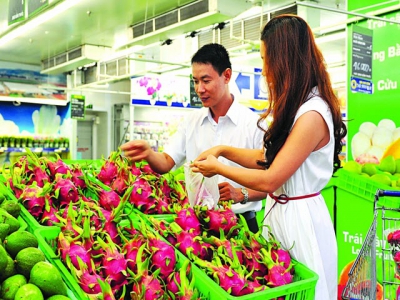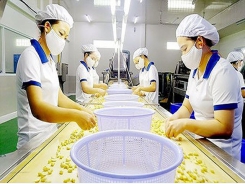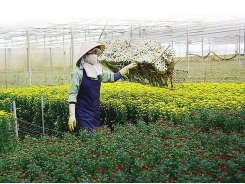MM Mega Market promotes Vietnamese agriproducts

Having put its fourth food platform into operation in Vietnam recently, MM Mega Market (MM) is fast-tracking production links to promote exports of Vietnamese agricultural products. Vietnam Economic News’ Huynh Pham spoke with Phidsanu Pongwatana, Managing Director of MM Mega Market Vietnam, about the company’s strategy to develop an agricultural model.
We learned that MM Mega Market Vietnam just set in motion its first fruit platform in Vietnam. Can you share something about MM’s underlying strategy of the Ben Tre Fruit platform?
As part of our strategy to push for strong growth of safe food supply chains for Vietnam, the Ben Tre fruit platform began operation in late October as a source of safe quality fruit products for our 19 stores across the country. More importantly, this depot will also be an export base for Vietnamese fruit exports to China, Thailand and other Southeast Asian countries.
In the 2018 Phase I, Ben Tre Fruit Platform is projected to process about 15 tonnes per day. In Phase II in 2019, the depot’s capacity will likely soar to about 50 tonnes per day. In 2019, we will make good on our promise to expand vegetable and fruit exports to other Southeast Asian countries to at least six containers of merchandize per month.
To grow successfully, a sustainable agriculture value chain in a changing world, production links and outlets play a vital role. However, there is a view that production links and sales are the weakest links in the agricultural production chain of Vietnam. What is your view?
I really value the strong efforts by the Vietnamese government to grow and develop agricultural value chains in recent years. However, despite the initial progress, connecting production and sales remains a weak link, as outlet markets are still unsustainable. If we do better in connecting supply and demand, I believe that Vietnamese agricultural products will gain a significant reputation in regional markets.
In practice, the “good crop bad price”’ dilemma seen over the years with many agricultural products is still ongoing at a huge cost to local agriculture and farmers in particular. If the link between production and sales can be further solidified, there is a good chance these challenges can be addressed.
We have been working on the development of sustainable value chains in agriculture since 2005 by growing a network of food platforms and entering into hands-on partnerships with local farmers to source high-quality supply for our 19-store system in the country and export to Thailand.
What do you think Vietnam can do to further improve production linkage and sales so that the agribusiness model along value chains works better to enhance the value of Vietnamese agriproducts?
To improve the link between production and sales, we believe that the roles of the farmers and companies in value chains should be clearly defined. In this picture, businesses will take a leadership role, counseling the farmers on seeds and breeds, techniques and technology, and production process monitoring, especially in output planning and connecting sales channels.
In this linked system, the farmer will become a vital element and should closely cooperate and comply with production processes guided by businesses to make sure that the products are of high quality and meet national and international standards. This is a win-win relationship that is mutually beneficial, where risks and benefits are shared. The link between production and sales can be effectively strengthened only through a strong and sustainable partnership between the farmer and business.
Having run this value chain linkage model for over a decade, can you say something about MM’s way of developing production linkages with farmers through the four food platforms?
At these four food platforms, MM has been working very closely with the farms. MM agricultural engineers work with local farmers and cooperatives every step of the way, from seed selection to production planning, harvesting, packaging and hauling to platforms, without having to go through middlemen, as a way to assure MM’s best standards for quality and food safety.
Farming households joining the loop will need to maintain a farm logbook, recording in detail how they use pesticides, keeping a journal of harvesting work, and conducting periodic quality testing in accordance with MM Mega Market Vietnam’s prevailing norms.
Can you disclose MM’s agriproducts export plan for 2019?
Since the beginning of 2018, we have been exporting four containers per month, or an equivalent of 100 tons a month of staple products, including dragon fruit, sweet potatoes, various snacks, among others. After almost a year exporting Vietnamese produce to Thailand’s 700-mall Big C system, these products are now much welcomed by Thai consumers.
Given the increasing demand, MM Mega Market Vietnam plans to double output, to approximately 200 tons per month in 2019. In addition to the traditional exports from this year, MM Mega Market will continue launching more new and high value product lines, including frozen catfish, cuttlefish, milk fruit, and especially pomelo, to Thailand and other markets.
Có thể bạn quan tâm
Phần mềm

Phối trộn thức ăn chăn nuôi

Pha dung dịch thủy canh

Định mức cho tôm ăn

Phối trộn phân bón NPK

Xác định tỷ lệ tôm sống

Chuyển đổi đơn vị phân bón

Xác định công suất sục khí

Chuyển đổi đơn vị tôm

Tính diện tích nhà kính

Tính thể tích ao hồ



 Vietnamese farmers, European consumers to benefit from trade…
Vietnamese farmers, European consumers to benefit from trade…  Vietnam retains its position as world’s leading cashew…
Vietnam retains its position as world’s leading cashew…